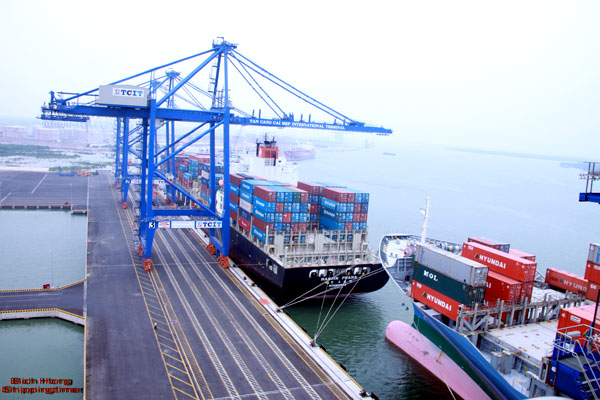Hanjin Shipping unloads shares in Vietnamese terminal
 |
In a filing to the Korea Exchange on July 12, the company said that it sold its shares to affiliated company Hanjin Transportation for KRW22.9 billion ($20 million).
TCIT is a joint venture of Saigon Newport Corporation with Hanjin, Mitsui OSK Lines, and Wan Hai.
According to the company website, TCIT handled 979,221 twenty-foot equivalent units (TEUs) in 2015, up 6 per cent on-year. In 2015, the trading activity between Vietnamese enterprises and overseas partners grew by 12 per cent on-year.
TCIT continued to maintain the biggest market share in the Cai Mep-Thi Vai port complex in the southern province of Ba Ria-Vung Tau. In 2015, it accounted for around 67 per cent of the area’s total throughput volume, compared to runner-up Cai Mep International Terminal (CMIT)’s 376,062 TEUs accounting for 26 per cent, and Tan Cang-Cai Mep Thi Vai Terminal (TCTT)’s 101,190 accounting for 7 per cent.
In the first three months of 2016, TCIT handled 243,000 TEUs, up 4 per cent compared to the same period last year. In 2016, TCIT has made investments to upgrade its capacity to serve more mother vessels and expects to surpass the number of 1.1 million total throughput TEUs in 2016.
There are seven terminals in the Cai Mep-Thi Vai area. Besides TCIT, CMIT and TCTT mentioned above, there are Saigon International Terminals Vietnam (SITV), SP-PSA International Port (SP-PSA), Tan Cang – Cai Mep Container Terminal JSC (TCCT), whose throughput is counted together with TCIT, and SP-SSA International Container Services Joint Venture (SSIT).
Due to weak infrastructure that causes transportation to be slower and less convenient, the terminals have trouble competing with ports in Ho Chi Minh City and Binh Duong, and many of them have been operating at a lower-than-designed capacity. Earlier this month, the Ministry of Transportation announced measures to increase the operational efficiency of ports in the area, such as dredging to facilitate larger ships and accelerating the construction of nearby roads.
As of the end of 2015, Hanjin Shipping’s total debt reached KRW5.6 trillion ($4.8 million). The company plans to raise $400 million from selling assets in order to restructure its debts.
What the stars mean:
★ Poor ★ ★ Promising ★★★ Good ★★★★ Very good ★★★★★ Exceptional
Latest News
More News
- Businesses ramp up production as year-end orders surge (December 30, 2025 | 10:05)
- Vietjet chairwoman awarded Labour Hero title (December 29, 2025 | 13:06)
- How to unlock ESG value through green innovation (December 29, 2025 | 10:03)
- AI reshapes media and advertising industry (December 29, 2025 | 08:33)
- FPT and GELEX sign deal to develop blockchain tech for global markets (December 29, 2025 | 08:29)
- Vietnam’s GDP forecast to grow by 9 per cent in 2026 (December 29, 2025 | 08:29)
- Women entrepreneurs are key to Vietnam’s economic growth (December 29, 2025 | 08:00)
- Vietnam's top 500 value-creating enterprises announced (December 27, 2025 | 08:00)
- The PAN Group shaping a better future with ESG strategy (December 26, 2025 | 09:00)
- Masan Consumer officially lists on HSX, marking the next phase of value creation (December 25, 2025 | 13:20)

















 Mobile Version
Mobile Version